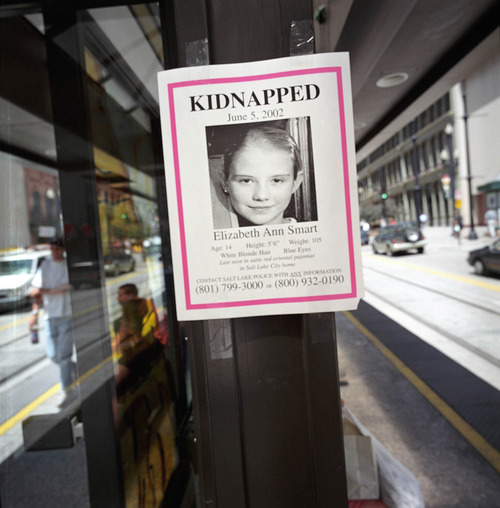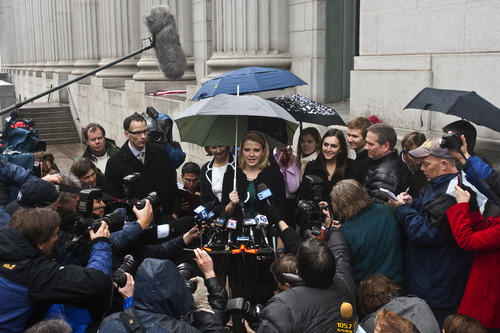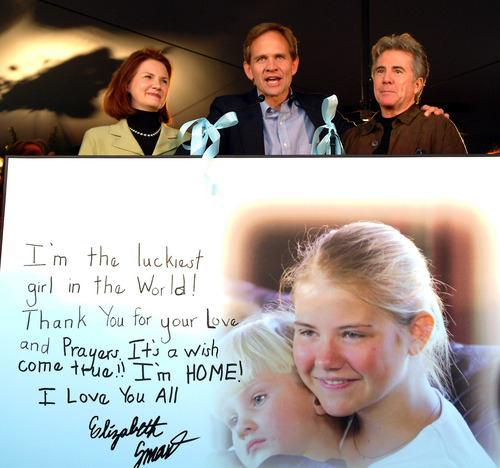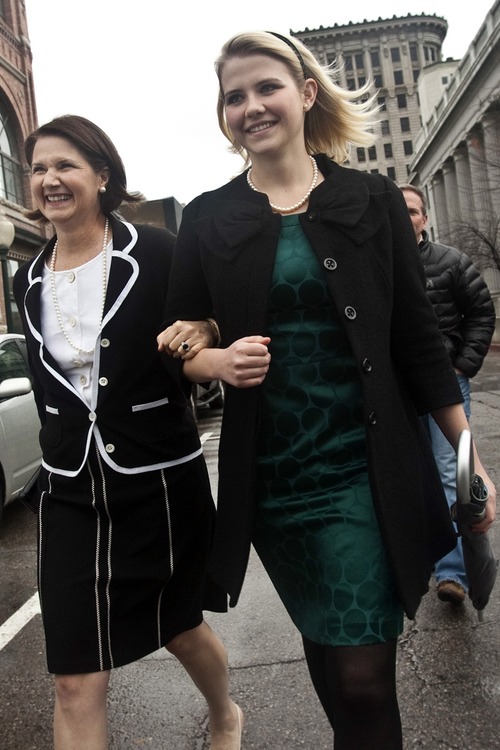This is an archived article that was published on sltrib.com in 2013, and information in the article may be outdated. It is provided only for personal research purposes and may not be reprinted.
Elizabeth Smart says in writing about her horrific kidnapping, an ordeal that caused her to relive her "nine months of hell," she had an ace in the hole: She knew the book's ending.
"I know how happy I am now, being married and being able to work in advocacy," Smart said in a phone interview to promote the release of her book, "My Story." "I know what my ending was."
The release of the book, co-written with Chris Stewart, now a Utah congressman, has put Smart back in the media spotlight, conducting rounds of TV and print interviews before she returns to Utah next week for three book events.
"My Story," released by St. Martin's Press, is expected to become a major best-seller, said executive editor Charles Spicer. The company has printed 250,000 copies, according to "Publishers Weekly."
Spicer termed the book a survival story, as well as "a great escape story," in particular the way the young girl manipulated her captors to return to Utah from California, where she thought she would be more likely to be recognized and rescued.
"She has never told her story before in book format, never told her whole story from beginning to end," Spicer said. "And that's why we thought this book was really unusual and had a lot of potential. Her attitude is so positive and strong. She was an incredibly strong 14-year-old and is an incredibly strong 25-year-old."
In Utah, of course, the outlines of Smart's story are well known, after extensive media coverage of her kidnapping by Brian David Mitchell from her family home on June 4, 2002, as well as her discovery nine months later in Sandy. Utahns, thousands of whom joined in search efforts, closely followed her story during her testimony in the federal trials of Mitchell and his wife, Wanda Barzee, as well as in the books published by her uncle and parents.
As Smart writes in "My Story": "My abduction was to become the most publicized case since baby Charles Lindbergh had been taken from his crib."
In many ways, Smart's book harks back to one of the earliest genres of American literature, the captive narrative, said M. Colleen McDannell, a University of Utah history professor. The first was published in 1682: "The Sovereignty and Goodness of God: Being a Narrative of the Captivity and Restoration of Mrs. Mary Rowlandson." The story of the narrator's 11-week kidnapping was the first full-length work to be published by a woman in the United States, and became an immediate best-seller.
Captive narratives published in the 17th and 18th centuries were marked by their stress on "vivid immediacy," as well as by descriptions of the mercy of God that helped the victim survive. "One of the functions of the captive narrative is that it shores up the bounds of normalcy against the threat of deviance," McDannell said.
Deviance, that is, like that of a bizarre Salt Lake City street preacher who targeted and kidnapping a young blond girl from her east-bench home and forced her to live as his "handmaiden" in a rough canyon campsite with Barzee. "Soon I was to learn," Smart writes. "To him, a handmaiden was a sex toy. To her, it was a slave."
The book unfolds in the first-person voice of a 14-year-old narrator, complete with stylish sentence fragments and frequent exclamations, without the layer of adult consciousness of the 25-year-old Smart. "That's how I experienced it, through my 14-year-old eyes," Smart said.
Stewart explained: "It was as authentic of a voice as we could have had."
"I can't describe the terror!" Smart writes after a dark man armed with a long black serrated knife had threatened to kill her and yanked her out of her bed. "It is simply impossible to express. Here I was, a little girl, in the middle of the night, being taken from my bed, from my own home, from what I thought was the safest place in the entire world. It was an unimaginable intrusion! Everything that I had thought, every feeling of safety or comfort, every assumption of protection, was stolen in that instant. My world spun on its head."
The pair worked on the book for more than two years, starting with recorded conversations that turned into shared drafts through email. "She is so determined to live a happy life," Stewart said. "It took awhile for us to figure out how to tell that story and put it under those terms."
Smart kicked off the process by listing all the episodes that she wanted to include in the book, and began noting everything she could remember, then sent drafts to Stewart, who also drew upon court testimony. "He would rearrange everything so it made sense, and we would email it back and forth until we were happy with it," Smart said.
Smart details how she endured being raped daily, which left her feeling broken and less than human. She suffered incredible boredom and deprivation, sometimes going days without food or water. At times, she wanted to die. "My routine was very simple. Boredom. Hunger. Rape."
"Somehow, time has a funny way of continually moving," she says now, explaining how she overcame her doubts. "That day would pass, and another day would pass, and somehow that dark time would pass."
One question guided her: "Over time, I slipped deeper and deeper into pure survival mode until I came to measure every situation by only one thing: Was it going to help me to survive?" Smart writes.
Yet she retained her faith in a loving God, and she writes of the "tender mercies" she experienced during her ordeal. "I think of Him as someone who comforts and loves everyone," Smart writes. "Even after I had been raped, I still thought of Him that way. He loves us all. Even me. Even still."
"My Story" details multiple near-misses in the search for Smart, including the police car that passed by her and Mitchell on the road behind her family home just minutes after she was kidnapped, or hearing her Uncle David's voice calling for her as part of a search party on the third day after her kidnapping. Each time, Mitchell threatened to kill Smart's family if she attempted to escape.
The book also describes her brave challenge to her captor just hours after she was taken, as they were climbing through a dark June night up Dry Creek Canyon. "If you're going to rape and kill me, please do it here," the girl said. "That way somebody will find my body." "Keep moving," she was told.
The next day, at the high-mountain campsite where Mitchell was chaining her ankle with a steel cable to a tree, she realized he had gone to too much trouble to kill her. "Then I had the most horrible thought of all," Smart writes. "What if this goes on forever? Is this to be the only life I will ever know?"
"My Story" chronicles her faith, aided by her memories of her family, and what she felt was the spiritual presence of her beloved grandfather, who had passed away just days before she was kidnapped. Realizing that her family would love her, no matter what her captors did to her, "meant I had something still to live for."
And along the way she realized her youth was an advantage. Mitchell, with his long beard and salt-and-pepper hair "had to be at least as old as my father, which meant I could outlive them. The thought was like a lightning bolt inside my mind. It might be 20 years, or maybe 30, but one day they were going to die. ... And I could go back to my life."
facebook.com/ellen.weist —
"My Story": Elizabeth Smart appearances
When • Saturday, Oct. 12, 11 a.m.
Also • Saturday, Oct. 12, 3:30 p.m.
Where • Costco, 648 E. 800 South, Orem
When • Saturday, Oct. 12, 3:30 p.m.
Where • Costco, 5201 Intermountain Drive, Murray
When • Monday, Oct. 14, 6 p.m.
Where • Deseret Books, 45 W. South Temple, Salt Lake City
When • Tuesday, Oct. 15, 7 p.m.
Where • Grand Theatre, 1575 S. State St., Salt Lake Community College South campus, Salt Lake City
Info • Buy the book at The King's English to reserve a place in the signing line.











